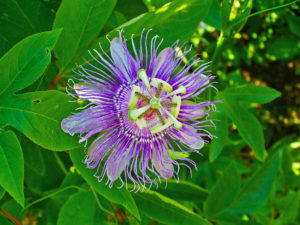Passiflora incarnata, commonly known as maypop, purple passionflower, true passionflower, wild apricot, and wild passion vine, is a fast-growing perennial vine with climbing or trailing stems. A member of the passionflower genus Passiflora, the maypop has large, intricate flowers with prominent styles and stamens. One of the hardiest species of passionflower, it is a common wildflower in the southern United States.
Contents
Uses
Historically, the plant been used as a herbal medicine to treat nervous anxiety and insomnia. The dried, ground herb is frequently used in Europe by drinking a teaspoon of it in tea. A sedative chewing gum has even been produced albeit no sedative qualities have been noted, nor medical benefits beyond placebo.
P. incarnata has been used to reduce hypertension. Methanol extractions from the leaves has been reported to be an effective antitussive in mice.
After being brought to Europe, it became a popular remedy in herbology as a natural remedy for the relief of mild symptoms of mental stress, anxiety nervousness, constipation, dispepsia, mild infections and insomnia.
In North America it is used for the treatment of diarrhea, premenstrual syndrome, dysmenorrhea, neuralgia, burns, hemorrhoids, insomnia, muscle cramps, hysteria, neuralgia, and as a pain reliever for various conditions. P. incarnata is still used by Native Americans, for example Cherokees use the root of the plant as topical antiinflammatory medicine. Tea made from the roots is used as a tonic for the liver and for skin boils. The extracts of P. incarnata were also used for the relief of nervousness, abdominal cramps and anxiety
Benefits
Passionflower is used for sleep problems (insomnia), gastrointestinal (GI) upset related to anxiety or nervousness, generalized anxiety disorder (GAD), and relieving symptoms related to narcotic drug withdrawal.
Passionflower is also used for seizures, hysteria, asthma, symptoms of menopause, attention deficit-hyperactivity disorder (ADHD), nervousness and excitability, palpitations, irregular heartbeat, high blood pressure, fibromyalgia, and pain relief.
Some people apply passionflower to the skin for hemorrhoids, burns, and pain and swelling (inflammation).
In foods and beverages, passionflower extract is used as a flavoring.
In 1569, Spanish explorers discovered passionflower in Peru. They believed the flowers symbolized Christ’s passion and indicated his approval for their exploration. Passionflower is found in combination herbal products used as a sedative for promoting calmness and relaxation. Other herbs contained in these products include German chamomile, hops, kava, skullcap, and valerian.
Passionflower was formerly approved as an over-the-counter sedative and sleep aid in the U.S., but it was taken off the market in 1978 because safety and effectiveness had not been proven. However, passionflower may still be available alone or in combination with other herbal products.
Cautions
Passionflower is LIKELY SAFE for most people when taken by mouth in amounts normally found in food. It is POSSIBLY SAFE when taken short-term (less than two months) as medicine or tea. It is POSSIBLY UNSAFE when taken by mouth in large amounts.
Passionflower can cause some side effects such as dizziness, confusion, irregular muscle action and coordination, altered consciousness, and inflamed blood vessels. There has also been a report of nausea, vomiting, drowsiness, a rapid heart rate, and abnormal heart rhythm in one person who took it.
There isn’t enough information to rate the safety of passionflower when applied to the skin.
Special Precautions & Warnings:
Pregnancy and breast-feeding: Don’t take passionflower if you are pregnant. It is UNSAFE. There are some chemicals in passionflower that might cause the uterus to contract.
Not enough is known about the safety of taking passionflower during breast-feeding. Stay on the safe side and don’t use it.
Surgery: Passionflower can affect the central nervous system. It might increase the effects of anesthesia and other medications on the brain during and after surgery. Stop taking passionflower at least 2 weeks before a scheduled surgery.
Interactions
Sedative medications (CNS depressants) interacts with PASSIONFLOWER
Passionflower might cause sleepiness and drowsiness. Medications that cause sleepiness are called sedatives. Taking passionflower along with sedative medications might cause too much sleepiness.
Some sedative medications include pentobarbital (Nembutal), phenobarbital (Luminal), secobarbital (Seconal), clonazepam (Klonopin), lorazepam (Ativan), zolpidem (Ambien), and others.
Other names
Apricot Vine, Corona de Cristo, Fleischfarbige, Fleur de la Passion, Fleur de Passiflore, Flor de Passion, Grenadille, Madre Selva, Maracuja, Maypop, Maypop Passion Flower, Pasiflora, Passiflora, Passiflora incarnata, Passiflorae Herba, Passiflore, Passiflore Aubépine, Passiflore Officinale, Passiflore Purpurine, Passiflore Rouge, Passiflorina, Passion Vine, Passionaria, Passionblume, Passionflower Herb, Passionsblumenkraut, Purple Passion Flower, Water Lemon, Wild Passion Flower
References
Source: WebMD, http://www.webmd.com/vitamins-supplements/ingredientmono-871-passionflower.aspx?activeingredientid=871
Drugs.com, http://www.drugs.com/npc/passion-flower.html
Wikipedia, https://en.wikipedia.org/wiki/Passiflora_incarnata#Medicinal_use

